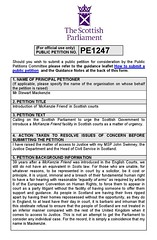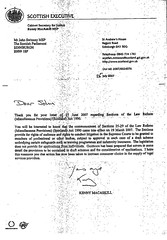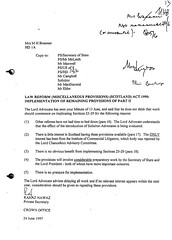The Scottish Parliament’s Petitions Committee comes in for some all-singing, all-dancing praise in the Scotsman newspaper, although despite the congratulatory tone of the article, it seems that many petitions along the theme of law reform, are excluded. (yes, but that’s because the Law Society calls in petitions they feel shouldn’t be heard – Ed)
The Scotsman reports :
Petitions are giving power to the people of Scotland
Published Date: 30 April 2009
CITIZENS can bring about real change by signing their names, finds John Forsyth
ALAS, it's not that common to stumble across a civil servant who bounces with enthusiasm about his job. Fergus Cochrane, the clerk to the Public Petitions Committee of the Scottish Parliament, is among the few – the precious few.
He is close to evangelical about the role petitions play in giving ordinary members of the public direct access to the Holyrood parliamentary process.
It is hard to recall the dark days of the late 1980s and early 1990s when the dogged members of the Scottish Constitution Convention planned for an assembly that would be "different". The Public Petitions Committee is one of the genuine differences.
Any member of the public can lodge a petition and have the substance considered in public session. Evidence is heard, investigations conducted and conclusions brought to the attention of the Scottish Government.
"What makes it unique," says Mr Cochrane, "Is first that it is genuine access for members of the public. Their petition doesn't have to be "bought into" or endorsed by an MSP. Secondly, it is a petition that requires a parliamentary response. Ten Downing Street has an e-petitions site, but if 35,000 people sign up on an issue, or boxes of personally signed petitions are delivered to the doorstep, what do they amount to, unless a minister wants to pick the issue up?"
Current Petitions Committee convener, Frank McAveety, says the public petitions principle is built on the founding concept of the parliament: "The case for Holyrood was that sovereignty rests not with the government or with the Crown but with the Scottish people. The citizen has a right to engage parliament in issues that affect him or her and that may highlight important issues long before they would get on the radar of MSPs or government apparatus."
History, and the website at www.scottish.parliament.uk, record that the first petition was lodged on 14 June 1999 by Rev David R Beatty of Sandwick and Cunningsburgh Free Churches. It drew 40 signatories.
Petition PE001 called for parliament to take the necessary steps to introduce prayers to its the proceedings. On 10 September 1999 the record notes: "The parliament reached a decision to hold multi-denomination prayers, which the petitioner was informed of." A result.
The next meeting of the all-party committee, next Monday, will consider five new petitions and receive progress reports on 19 others. Oral evidence will be presented in support of PE1248 calling for the restoration of safe standing areas at football stadia, and on PE1249 calling for the proper regulation of holiday and "party" flats.
The 19 already under way include two petitions to protect disabled parking spaces, one on the menace of high hedges and another urging greater effort in upgrading the A92.
It's an education in itself scrolling through the list of matters raised by the public over the last decade, sometimes by a single citizen. Around half of the petitions have been lodged by individuals, a quarter by community councils and the remainder by organisations and campaigns.
The committee had a public evidence session earlier this year on the welfare of Siamese fighting fish that may yet influence practice throughout the land.
At the other end of the spectrum, Petition PE1108 not only changed policy on the prescribing of cancer drugs in Scotland but in England and Wales too.
It was lodged in January 2008 by Tina McGeever and her terminally ill husband, Michael Gray, and called for an overhaul of the inconsistency between different parts of the NHS in funding cancer treatment drugs. After several evidence sessions, the committee endorsed the petition and required the Scottish Government to address the issue. Michael Gray's legacy is an overhaul of government instructions to the NHS.
Another petition, on abuse of children in care called, among other things, for an apology to victims. First Minister, Jack McConnell, stood up in plenary session and apologised "on behalf of the people of Scotland".
Petitions can be submitted on paper or through the website. The first eyes to see it are those of Fergus Cochrane: "My job as clerk is to work with the petitioners to help the focus on the issue. Some are ruled out because they raise issues that fall outwith the powers of Holyrood. Though even going through that discussion with petitioners has some value for them in demonstrating they were taken seriously.
"Most petitioners will get at least two public sessions for their petition. The committee has never had a vote – the only issue the members have to resolve is when to close a petition, and the reality is if one member thinks there are still investigations that could be carried out, the petition will be continued."
Meetings have been held around Scotland with the aim of raising, not just the profile but also understanding of the process. The committee is also conducting a public consultation on its effectiveness and looking for suggestions on how to improve awareness of its work.
In the meantime, the committee's reputation has travelled further afield, with legislatures from South Africa, Australia, Wales, Saxony and Catalonia showing great interest in the system, with a view to taking their own route to breaking the stranglehold of the politicians on access to parliamentary time.








